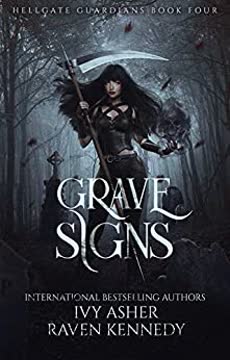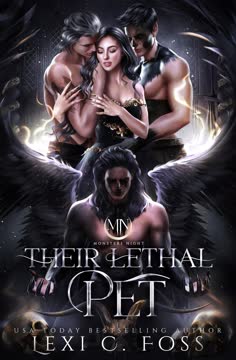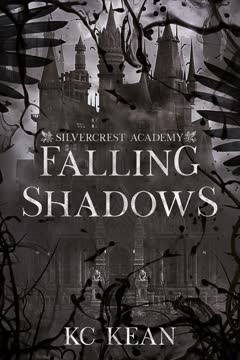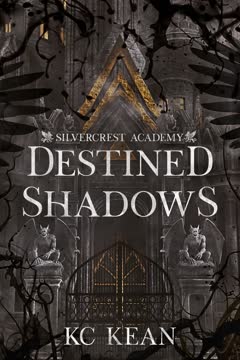Plot Summary
Desperate Job Search
Delta Gates, a snarky, struggling bartender, faces the closure of her bar and a mountain of debt. Her life is a patchwork of bad luck, loneliness, and the lingering ache of her parents' death. When a too-good-to-be-true job offer for a graveyard security position at the mysterious Perdition Estate lands in her inbox, desperation trumps suspicion. Eighty dollars an hour and full benefits seem like salvation, and Delta, with nothing left to lose, races to the interview, hoping for a break from her relentless string of misfortunes. The chapter pulses with anxiety, dark humor, and the raw hope of someone on the edge.
The Interview Oddity
At the posh, empty office, Delta's interview with the radiant Susan Atwood is laced with oddities: questions about "Rings," a focus on graveyard gates, and a lack of concern for her experience. The pay is confirmed, the benefits are real, and the only rule is to never call the authorities. Delta's skepticism is drowned by her need, and she accepts the job, ignoring the warning bells. The encounter is both comical and tense, as Delta's irreverence clashes with the eerie professionalism of the estate. She leaves, job in hand, feeling like luck has finally turned, but the reader senses the world is about to tilt.
First Night at Perdition
Arriving at the sprawling, gothic Perdition Estate, Delta is directed to a remote groundskeeper's cabin. Her "uniform" is a leather Xena cosplay, and her only equipment is a radio and a mysterious walking stick. The graveyard is vast and beautiful, but the job's strangeness grows: a sexy, unseen supervisor on the radio, cryptic warnings, and a sense that the gate she's guarding is more than ornamental. Delta's humor and bravado mask her unease as dusk falls, and the estate's secrets begin to stir. The chapter is thick with anticipation, blending the mundane with the supernatural.
Graveyard Encounters
As night deepens, Delta hears voices and strange noises from a mausoleum. Her attempts to confront trespassers lead to empty rooms and a growing sense of unreality. The radio supervisor, "Iceman," is unhelpful and cryptic. Delta's frustration and fear mount, but her stubbornness keeps her on post. The graveyard's peace is shattered by the sense that she's being watched by more than the living. The chapter is a slow-burn of suspense, with Delta's sarcasm and courage clashing against the unknown.
The Three Demon Bosses
Delta finally confronts the source of the disturbances: three striking, otherworldly men—Echo, Crux, and Jerif—who claim to own the gate. Their banter is bizarre, their names odder, and their interest in Delta unsettling. A scythe emerges from her walking stick, and the men are shocked by her ability to wield it. The encounter is a whirlwind of confusion, sexual tension, and hints of a deeper, supernatural order. Delta's irreverence is met with amusement and intrigue, but she senses she's in way over her head.
Unveiling the Truth
Summoned to the mansion, Delta is drawn into a world of demons masquerading as humans. The four bosses—Echo, Crux, Jerif, and Iceman (Rafferty)—reveal that she's not just a security guard, but a potential Hellgate Guardian. The estate is a front for a gateway to Hell, and Delta's ability to see through their wards marks her as a powerful, rare demon. The truth is overwhelming: her job is to help stabilize the gate, a task that has killed many before her. The chapter is a collision of horror, humor, and reluctant destiny.
Demonic Revelations
The bosses explain the Rings of Hell, the hierarchy of demons, and the dire state of the gate. Delta's scythe is a legendary weapon, and her last name—Gates—may not be a coincidence. She's tested, grilled, and ultimately told she's likely an Inner Ring demon, possibly even a lost Gatekeeper. The men bicker over her potential, and Delta's panic and denial give way to a grudging acceptance that her life is forever changed. The emotional arc is raw: fear, anger, and the first glimmers of belonging.
Running from Destiny
Overwhelmed, Delta bolts from the estate, scythe in hand, determined to return to her old life. But the world has shifted: she now sees demons everywhere, from her kindly neighbor to strangers in the grocery store. Attacks by Outer Ring demons force her to seek help from the Guardians. Her attempts to deny her nature are met with violence and chaos, and she realizes that ignorance is no longer an option. The chapter is frantic, blending action, humor, and the ache of isolation.
Attacks and Awakening
Demons begin to target Delta, drawn by her unblocked power. The Guardians take turns protecting her, and she's forced to confront the reality of her heritage. A brutal attack leaves her battered but alive, and her scythe's true power is revealed as she instinctively wields it to destroy her assailants. The experience is both traumatizing and exhilarating, awakening a dark, violent side she never knew she had. The chapter is a crucible, forging Delta's resolve and hinting at her true potential.
Reluctant Return
After a period of avoidance and self-destruction, Delta is convinced—by both guilt and the Guardians' need—to return to the estate and accept her place as a potential fifth Guardian. She's trained, tested, and slowly integrated into the team, her sarcasm and vulnerability winning over even the prickly Jerif. The Guardians' camaraderie, bickering, and growing affection for Delta create a found-family dynamic. The emotional arc is one of acceptance, growth, and the first stirrings of hope.
The Other Hellgate
The Guardians take Delta to a different Hellgate in Georgia, where she witnesses another team of Guardians—Flint and Alder—fighting off a demonic incursion. The battle is brutal, and Delta's scythe proves invaluable. She sees firsthand the cost of failure, the reality of the demonic threat, and the importance of her role. The experience bonds her further to her team and solidifies her commitment. The chapter is action-packed, with moments of dark humor and sexual tension.
Blood, Ash, and Battle
Back at Perdition, Delta is thrust into a full-scale attack on the graveyard. She fights alongside the Guardians, ashing demons with her scythe and barely surviving. The violence is both horrifying and empowering, and Delta is left shaken, covered in blood and ash, and questioning her own morality. The aftermath is a mix of pride, guilt, and the need for comfort, leading to moments of vulnerability and connection with the Guardians.
Sex, Shadows, and Scythes
The tension between Delta and the Guardians boils over into flirtation, innuendo, and supernatural sexual encounters. Echo's shadows, Crux's tongue, and Iceman's icy touch all become weapons of seduction. Delta's dreams blur the line between fantasy and reality, and the team's bond deepens into something both dangerous and irresistible. The chapter is a heady mix of humor, heat, and the ache of wanting to belong.
Facing the Past
As she prepares for the final test, Delta is haunted by memories of her parents and the mystery of her heritage. The Guardians, each with their own family ties and histories, share their stories, and Delta realizes that her loneliness is not unique. The kitchen renovation—done without her consent—becomes a metaphor for letting go of the past and embracing a new future. The emotional arc is bittersweet, blending grief, gratitude, and the courage to move forward.
Into the Depths of Hell
The Guardians lead Delta through the Hellgate, down endless, perilous stairs into the Vestibule—the crossroads of the Rings. The journey is fraught with danger, bickering, and moments of unexpected tenderness. Delta's fear is palpable, but so is her determination. The world-building is rich, with Hell depicted as both terrifying and strangely bureaucratic. The chapter is a descent—literal and metaphorical—into the unknown.
The Vestibule Test
At the Vestibule, Delta is tested at each Ring's portal. The process is harrowing, with the threat of death ever-present. As Outer Ring demons begin to swarm, the Guardians are forced to defend her, and Delta's scythe becomes a beacon of power. The test is interrupted by an ambush, and the team is separated. Delta's ability to pass through the highest Ring is hinted at, but chaos reigns before the truth can be confirmed.
Ambush in the Rings
The team is attacked by a horde of Outer Ring demons, their numbers and ferocity overwhelming even the Guardians' combined strength. Delta and Jerif are separated from the others, forced to fight back-to-back as the horde closes in. The battle is desperate, bloody, and hopeless, with Delta's powers pushed to their limits. The emotional arc is one of terror, loyalty, and the agony of impending loss.
Jerif's Last Stand
As the demons close in, Jerif is mortally wounded, his fire dimming as he's stabbed and overwhelmed. He begs Delta to run, to survive, and not let his death be in vain. Delta, torn between loyalty and survival, is forced to flee, her heart breaking as she leaves Jerif behind. The chapter is raw with grief, rage, and the shattering of Delta's found family.
Alone Against the Horde
Alone, battered, and pursued, Delta fights her way through the horde, ashing demons with her scythe and refusing to surrender. The net closes around her, and she's driven to the end of the corridor, cornered against the final portal. With no other option, she presses against the Nihil gate, expecting death but finding something else.
The Nihil Revelation
As the demons close in, Delta is absorbed into the Nihil portal—the center of Hell, the domain of the most powerful and ancient demons. The revelation is staggering: Delta is not just an Inner Ring demon, but a Nihil, a lost Gatekeeper, and the key to the fate of all the Hellgates. The chapter ends on a cliffhanger, with Delta's destiny—and the fate of her friends—hanging in the balance.
Characters
Delta Gates
Delta is a fiercely independent, sarcastic, and deeply wounded woman, shaped by loss and hardship. Her orphaned past, financial struggles, and self-deprecating humor mask a core of resilience and longing for connection. Psychoanalytically, Delta is driven by abandonment trauma, a fear of vulnerability, and a desperate need to prove her worth. Her journey is one of reluctant acceptance: from denial of her demonic nature to embracing her power as a Gatekeeper. Her relationships with the Guardians are fraught with sexual tension, camaraderie, and the ache of found family. Delta's arc is about reclaiming agency, facing her darkness, and learning that belonging is earned, not given.
Echo
Echo is enigmatic, pale, and tattooed, with the power to manipulate shadows. His wit is as sharp as his gaze, and he masks vulnerability with sarcasm and sexual bravado. Echo's relationship with Delta is electric, blending banter, rivalry, and deepening trust. Psychologically, Echo is haunted by loneliness and a sense of otherness, his shadow powers a metaphor for his struggle to connect. His development is tied to his willingness to let Delta in, to risk intimacy, and to fight for something beyond himself.
Crux
Crux is the most approachable of the Guardians, with a laid-back demeanor and a penchant for humor. His power is visceral—turning enemies inside out—but he's reluctant to use it, hinting at a deep aversion to violence. Crux's relationship with Delta is playful, flirty, and supportive, often acting as her anchor in chaos. Psychologically, Crux is the team's emotional glue, masking his own fears with jokes and bravado. His arc is about embracing responsibility and the cost of power.
Jerif
Jerif is the team's enforcer, with fire-based powers and a volcanic temper. His exterior is prickly, often clashing with Delta, but beneath the surface is a fierce loyalty and a deep sense of duty. Jerif's relationship with Delta evolves from antagonism to mutual respect, culminating in his self-sacrifice. Psychologically, Jerif is driven by guilt, a need for control, and a fear of failure. His arc is tragic, embodying the cost of heroism and the pain of letting go.
Iceman (Rafferty)
Iceman is the team's anchor, calm, strategic, and deeply protective. His powers are cold-based, and his demeanor is often reserved, but he cares deeply for his team. His relationship with Delta is complex: mentor, potential lover, and the one who believes in her most. Psychologically, Iceman is burdened by responsibility, haunted by past losses, and driven by a need to keep his found family safe. His arc is about learning to trust, delegate, and accept help.
Susan Atwood
Susan is the face of the estate's human world, beautiful, poised, and subtly inhuman. Her role is to identify and recruit potential Guardians, and her interactions with Delta are laced with double meanings and hidden agendas. Psychologically, Susan represents the seductive allure of the supernatural, the gatekeeper between worlds.
Flint
Flint is a Guardian at another Hellgate, embodying both the brutality and camaraderie of the role. His relationship with Delta is one of mutual respect and rivalry, highlighting the broader network of Guardians. Psychologically, Flint is a survivor, shaped by loss and the constant threat of failure.
Alder
Alder is Flint's partner, with powers tied to pollen and growth. His presence is calming, and his relationship with Delta is marked by curiosity and empathy. Psychologically, Alder represents the possibility of peace and the cost of violence.
Grumpy Lurch (Strut)
Strut is the estate's gatekeeper, both literally and figuratively. His disdain for Delta masks a deep commitment to the estate's rules and the safety of its inhabitants. Psychologically, Strut is the embodiment of tradition, resistant to change but ultimately loyal.
The Ophidian
The Ophidian is the shadowy force orchestrating the attacks on the Hellgates, seeking to capture Delta and destabilize the balance. Psychologically, the Ophidian represents the threat of the unknown, the chaos that lurks beyond the gates, and the darkness within.
Plot Devices
The Hellgate and the Rings
The Hellgate is both a literal and symbolic threshold, representing the boundary between worlds, identities, and destinies. The Rings of Hell structure the narrative, each level a test of power, heritage, and self-acceptance. The scythe is a classic "chosen one" artifact, responding only to Delta and marking her as unique. The narrative structure is a blend of quest, found family, and reverse harem romance, with each Guardian representing a different aspect of Delta's psyche and journey. Foreshadowing is woven through cryptic warnings, dreams, and the recurring motif of gates and thresholds. The story uses humor and sexual tension to offset the darkness, creating a tone that is both irreverent and emotionally resonant.
Analysis
Grave Mistakes is a subversive, darkly comedic urban fantasy that uses the trappings of reverse harem romance to explore themes of identity, trauma, and the search for belonging. At its core, the novel is about a woman who has been defined by loss and isolation, thrust into a world where her greatest weaknesses become her greatest strengths. The Hellgate is a metaphor for the boundaries we erect around ourselves, and Delta's journey is one of breaking through—embracing her darkness, her power, and her need for connection. The Guardians are not just love interests, but mirrors for Delta's fractured self: the shadow, the heart, the fire, the ice. The novel interrogates the idea of destiny versus choice, the cost of heroism, and the messy, painful process of healing. Its humor and sexual frankness are not just distractions, but tools for survival—a way to reclaim agency in a world that wants to define you by your wounds. Ultimately, Grave Mistakes is a story about the courage to face the gates within ourselves, to fight for a place in a world that feels determined to shut us out, and to find family in the most unlikely of places.
Last updated:
Review Summary
Grave Mistakes receives mixed reviews, with an average rating of 4.11 out of 5. Some readers praise the humor, engaging characters, and intriguing plot, while others criticize the main character Delta as immature and annoying. The book's crude humor and pop culture references are divisive. Many reviewers found the story slow-paced and repetitive, with Delta's denial and fear becoming tiresome. Despite these criticisms, fans of reverse harem and paranormal romance still enjoyed the book and look forward to the sequel.


















